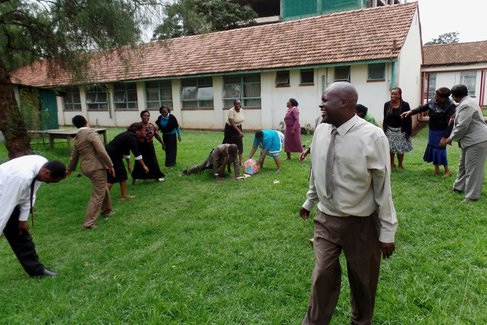 "Family ride," by Steven Mbatia. Source: True African Art.com
"Family ride," by Steven Mbatia. Source: True African Art.com
But with education, you’re asking people to think about their children’s lives for the first 25 years, and to consider the impact of those 25 years on the rest of their children’s lives and on the life of the nation. Thinking about education is clearly not as entertaining as party primaries.
Education therefore doesn’t stand a chance of making the headlines, although it might happen if CS Matiang’i showed up in the public with another hard talking by-line. However, I suspect he’s avoiding the limelight to keep education out of the public eye. And his strategy is working.
And yet, the drama of the so called new curriculum is actually quite interesting. It would even be funny, if the implications were not so serious.
 KICD participants in one of the activities at the Arigatou Curriculum Workshop. Source: Arigatou International
KICD participants in one of the activities at the Arigatou Curriculum Workshop. Source: Arigatou International But a more interesting story is about a guy called Peter Hall Jones, who is thanked in the framework document “for providing technical support to conceptualisation, design and development of the Framework.” Dr/Mr Jones’s involvement in the curriculum should strike us as odd.
First, he was involved in the curriculum framework thanks to guess who: the British Council. For now, I won’t go over the strange fact that the British Council is cited all over the framework, but not even one publication by the Council is listed in the bibliography. What is even stranger, though, is that it is the British Council, not the British Department of Education, which sponsored Dr/Mr Jones to play an instrumental role in the curriculum. Recall that the goal of the British Council is to promote British interests abroad through culture, and especially through the teaching of English. So from the UK’s end, its involvement in Kenya’s curriculum reform is about its cultural interests, not about education.
And when I checked Dr/Mr Jones on both the British Council and uk.gov websites, I couldn’t find his name. When I searched his name with British Council on google, the best document I could find was one indicating that he was a guide for international governments taking a tour through British schools and education bodies to learn about curriculum reform. His credentials are listed not by his expertise as a scholar of education but by his innovative approach as a teacher. He then formed an NGO called Curriculum Foundation, and also lists himself as a motivational speaker who talks about curriculum.
Whether Dr/Mr Jones is qualified to be behind a restructuring of our NATIONAL education system isn’t as important as the fact that he is someone even the British Government would not allow to tinker with their own education system. Yet that’s who the Kenyan government, which made so much noise about sovereignty during ICC trials, gave the responsibility of drafting our framework.
So our brand new curriculum was done by a tour guide and motivational speaker. Think about that.
A side bar is that the tour of British schools is probably the same one that the TSC said gave them the idea of performance contracting for teachers. The sad part is that many British teachers and educationists have decried the damage that managerialism has done to British education, yet our ministry decided to impose the same thing on our own teachers.
It’s like we pick the wrong ideas from Europe and plaster them here just because they’re from Europe. Think about that.
I discovered the other interesting drama thanks to a comment on my facebook posts by a Kenyan who, in the company of some leaders, tried to get the ear of KICD to offer some suggestions on the curriculum. He said the KICD official who welcomed them treated them very poorly, talking on the phone during the short few minutes they were in his office, before sending them off to juniors who couldn’t do a thing, except inform them that they would need to spend KES 6 million on conducting a workshop for the officials.
The next day, these Kenyans heard that KICD officials were taken through a workshop by Arigatou International, a Japanese NGO based in Geneva. Apparently, Arigatou has published a document called “Learning to Live together,” which has now been mainstreamed in guess what: our education curriculum.
So our kids are going to be taught to “live together” through a curriculum that was developed by a Japanese NGO. Think about that.
And for those Kenyans who think “who cares, as long as my kid passes exams?” let me tell you why this idea is a literal joke. The curriculum, which you can read for yourself, has no history and doesn’t talk of justice. That means that our children will not get to understand the specific Kenyan injustices that cause us not to “live together.” But more than that, our African stories and communities have mechanisms for conflict resolution and justice which any KICD official could have read about and incorporated in the curriculum by walking into a Kenyan university. But I guess that wouldn’t happen if the university wasn’t offering to pay millions for a workshop.
Oh, and I must mention that the KICD officials had a lot of fun at the Arigatou workshop.
What is clearly happening in this Kenya is that while our constitution calls for public participation in issues and policies that affect us, real participation is reserved for anyone who can pay “top dollar” for workshops for civil servants. Any foreigner, from a tour guide to a NGO, can walk into a government office, sponsor a workshop, and before you know it, wananchi are being affected by policies whose origins they do not know. Yet we Africans don’t have the same kind of influence in the decisions that affect us. If chances of the greatest Kenyan expert passing through the visa process to reach the UK are slim, chances of that expert changing UK curriculum or organizing a workshop for officers in Her Majesty’s Department of Education are beyond zero (pun intended).
And yet, while her Majesty’s subjects can spearhead curriculum reform in Kenya, we Kenyans cannot participate in the reform in our own country. As I rant on facebook many times, Kenyans have told me to forward the issues I have to the relevant government bodies. But besides getting the treatment that the Kenyans got in the KICD office, I have also heard that to get onto the calendar of important government officials, their personal assistants charge a hefty sum.
And in any case, is it our job to look for government officials or is it their job to collect our views?
*
So tomorrow marks the day when a foreign-sponsored curriculum framework, with almost no African voices in it, and with outdated scholarship, will be piloted in Kenyan schools, supposedly to address 21st century issues. The hostility of some members of the Kenyan public to my concerns has been as shocking to me as the hostility to my statements about healthcare a few months ago. Some of us really don’t care what happens to our children, or what our children are taught. And when this new system fails to deliver the heaven they claim it will, the same people who do not care will blame the teachers, and the TSC will impose even stricter performance contracts.
That is neoliberalism, Kenya edition. Where grossly uniformed decisions on fundamental social issues are made by those with money, and when problems inevitably occur, the decision makers will impose tighter supervision of professionals whose opinion should have been sought before changes were made.
The other lesson in this sad story of curriculum reform is that we need a law regulating the training or workshops which Kenyan civil servants receive from foreign governments, corporates and NGO’s. Our national integrity is being compromised by these meetings where ideologies and business deals determine the key national sectors of health, education and environment, without any public scrutiny. It should not be so easy for some unimportant fellow in Europe to walk into Kenya and make fundamental decisions with national impact, when we Kenyans can’t get a word in.
But surely, if a hairdresser can walk around with billions of taxpayers’ money, because she styled the hair of a client now nominated to run for governor, it is no wonder that we let foreign nobodies play such decisive roles in how we educate our own children. And our leaders can afford to be so casual about our national education because their kids attend private international curriculum schools in Kenya and abroad.
 RSS Feed
RSS Feed
